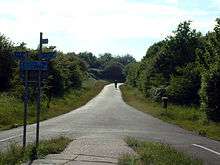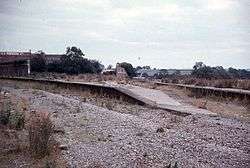Mangotsfield railway station
| Mangotsfield | |
|---|---|
|
Mangotsfield railway station in 1973 | |
| Location | |
| Place | Mangotsfield |
| Area | South Gloucestershire |
| Grid reference | ST665753 |
| Operations | |
| Pre-grouping | Midland Railway |
| Post-grouping |
London, Midland and Scottish Railway London Midland Region of British Railways |
| Platforms | 6 |
| History | |
| 1 May 1845 | Opened |
| 4 August 1869 | Rebuilt 805m south |
| 7 March 1966 | Closed |
| Disused railway stations in the United Kingdom | |
|
Closed railway stations in Britain A B C D–F G H–J K–L M–O P–R S T–V W–Z | |
|
| |

| Bristol and Gloucester Railway | ||||||||||||||||||||||||||||||||||||||||||||||||||||||||||||||||||||||||||||||||||||||||||||||||||||||||||||||||||||||||||||||||||||||||||||||||||||||||||||||||||||||||||||||||||||||||||||||||||||||||||||||||||||||||||||||||||||||||||||||||||||||||||||||||||||||||||||||||||||||||||||||||||||||||||||||||||||||||||||||||||||||||||||||||||||||||||||||||||||||||||||||||||||||||||||||||||||||||||||||||||||||||||||||||||||||||||||||||||||||||||||||||||||||||||||||||||||||||||||||||||||||||||||||||||
|---|---|---|---|---|---|---|---|---|---|---|---|---|---|---|---|---|---|---|---|---|---|---|---|---|---|---|---|---|---|---|---|---|---|---|---|---|---|---|---|---|---|---|---|---|---|---|---|---|---|---|---|---|---|---|---|---|---|---|---|---|---|---|---|---|---|---|---|---|---|---|---|---|---|---|---|---|---|---|---|---|---|---|---|---|---|---|---|---|---|---|---|---|---|---|---|---|---|---|---|---|---|---|---|---|---|---|---|---|---|---|---|---|---|---|---|---|---|---|---|---|---|---|---|---|---|---|---|---|---|---|---|---|---|---|---|---|---|---|---|---|---|---|---|---|---|---|---|---|---|---|---|---|---|---|---|---|---|---|---|---|---|---|---|---|---|---|---|---|---|---|---|---|---|---|---|---|---|---|---|---|---|---|---|---|---|---|---|---|---|---|---|---|---|---|---|---|---|---|---|---|---|---|---|---|---|---|---|---|---|---|---|---|---|---|---|---|---|---|---|---|---|---|---|---|---|---|---|---|---|---|---|---|---|---|---|---|---|---|---|---|---|---|---|---|---|---|---|---|---|---|---|---|---|---|---|---|---|---|---|---|---|---|---|---|---|---|---|---|---|---|---|---|---|---|---|---|---|---|---|---|---|---|---|---|---|---|---|---|---|---|---|---|---|---|---|---|---|---|---|---|---|---|---|---|---|---|---|---|---|---|---|---|---|---|---|---|---|---|---|---|---|---|---|---|---|---|---|---|---|---|---|---|---|---|---|---|---|---|---|---|---|---|---|---|---|---|---|---|---|---|---|---|---|---|---|---|---|---|---|---|---|---|---|---|---|---|---|---|---|---|---|---|---|---|---|---|---|---|---|---|---|---|---|---|---|---|---|---|---|---|---|---|---|---|---|---|---|---|---|---|---|---|---|---|---|---|---|---|---|---|---|---|---|---|---|---|---|---|---|---|---|---|---|---|---|---|---|---|---|---|---|---|---|---|---|---|---|---|---|---|---|---|---|---|---|---|---|---|---|---|---|---|---|---|---|---|---|---|---|---|---|---|---|---|---|---|---|---|---|---|---|---|---|---|---|---|---|---|---|---|---|---|---|---|---|---|---|---|---|---|---|---|---|---|---|---|---|---|
Legend | ||||||||||||||||||||||||||||||||||||||||||||||||||||||||||||||||||||||||||||||||||||||||||||||||||||||||||||||||||||||||||||||||||||||||||||||||||||||||||||||||||||||||||||||||||||||||||||||||||||||||||||||||||||||||||||||||||||||||||||||||||||||||||||||||||||||||||||||||||||||||||||||||||||||||||||||||||||||||||||||||||||||||||||||||||||||||||||||||||||||||||||||||||||||||||||||||||||||||||||||||||||||||||||||||||||||||||||||||||||||||||||||||||||||||||||||||||||||||||||||||||||||||||||||||||
| ||||||||||||||||||||||||||||||||||||||||||||||||||||||||||||||||||||||||||||||||||||||||||||||||||||||||||||||||||||||||||||||||||||||||||||||||||||||||||||||||||||||||||||||||||||||||||||||||||||||||||||||||||||||||||||||||||||||||||||||||||||||||||||||||||||||||||||||||||||||||||||||||||||||||||||||||||||||||||||||||||||||||||||||||||||||||||||||||||||||||||||||||||||||||||||||||||||||||||||||||||||||||||||||||||||||||||||||||||||||||||||||||||||||||||||||||||||||||||||||||||||||||||||||||||
Mangotsfield railway station was a station on the Midland Railway Bristol and Gloucester main line and was situated about five miles to the north east of Bristol in what is now the suburb of Mangotsfield.
New buildings were provided by the architect to the Midland Railway, John Holloway Sanders in 1883.[1]
The station was the junction for the Mangotsfield and Bath Branch Line that led to Bath Green Park railway station and on southwards over the Somerset and Dorset Joint Railway to Bournemouth. It had six platforms, including a bay platform used by the passenger service to Clifton Down using the Clifton Extension Railway. The latter services were discontinued in 1940 following the outbreak of war and were never reinstated. Part of the line to Bath now forms the Avon Valley Railway, which has its headquarters at Bitton.
The line to Bath was strengthened in the 1930s so as to take heavier locomotives and the station was very busy until the 1960s, when the Beeching Report recommended closure. The station closed in 1966 when services between Bristol and Bath on the line were withdrawn; stopping services between Bristol and Gloucester on the Midland line had been withdrawn in 1965. The last regular through passenger trains to use the third side of the triangle, which connected Bath and Gloucester but bypassed the station itself was the Pines Express in 1962. Fast trains continued to pass through the station ended in 1969 with the re-routing of the Bristol to Gloucester services via Filton.
Carson's chocolate factory occupied the centre of the triangle (along with its own cricket pitch) and had its own siding which saw chocolate trains until the early 1960s. The station also handled a lot of racing pigeon traffic, the birds being loaded into special vans. The mail train, which in the days of the Travelling Post Office always had to have the mail catcher on the left, was turned every day on the triangle until the mid-1960s.
The station was the inspiration behind Arnold Ridley's play The Ghost Train after Ridley found himself stranded there one evening. The sound of a train on the curve bypassing the station (used by non-stopping trains between Bath and Gloucester) gave the impression of a train approaching, passing and departing but not being seen.
The station is now on the route of the Bristol & Bath Railway Path, part of National Cycle Route 4.
Services
| Preceding station | Disused railways | Following station | ||
|---|---|---|---|---|
| Staple Hill Line and station closed |
Midland Railway Bristol and Gloucester Railway |
Yate Line closed, station open | ||
| Terminus | Midland Railway Mangotsfield and Bath Branch Line |
Warmley Line and station closed | ||
References
- ↑ "New station at Mangotsfield". Western Daily Press. British Newspaper Archive. 25 June 1883. Retrieved 7 August 2016 – via British Newspaper Archive. (subscription required (help)).
- Daniels, Gerald David; Dench, Leslie Alan (May 1973) [1964]. Passengers No More (2nd ed.). Shepperton: Ian Allan. p. 74. ISBN 0-7110-0438-2. OCLC 2554248. 1513 CEC 573.
External links
Coordinates: 51°28′33″N 2°28′59″W / 51.4757°N 2.4830°W
